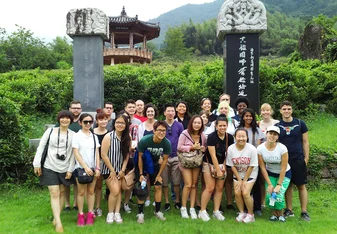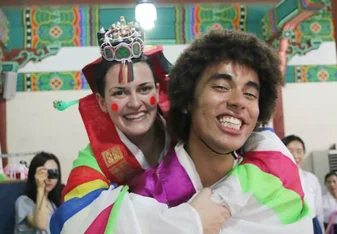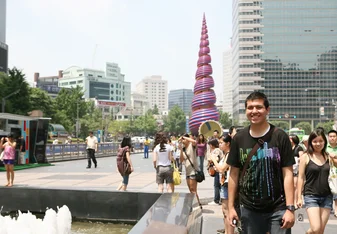
How to Study Abroad in South Korea as an International Student in 2025
Studying abroad in Korea is easier than you think! Read our step-by-step guide to find out how.
Let’s face it: South Korea is just plain cool. K-pop, K-dramas, soju, kimchi and BBQ, and fabulous skin care products are only a few of the things this awesome country has given the world.
If you’d love to have a chance to live the dream in South Korea, why not attend one of their world-class universities as a study abroad student? No really, it’s easier than you think! Read on to find out how to study in South Korea as an international student in 2025.
1.Consider location
If you’ve never been to Korea, you may not have a clue about the best places to study abroad as an international student. While there are countless options, here are some of the top destinations in South Korea for foreign students.
- Seoul: South Korea’s capital isn’t just an international hub, it’s also an educational powerhouse. With over 30 universities to choose from, you’ll get to enjoy the benefits of big-city life when you’re not in the classroom.
- Busan: A port city on the southeastern coast, Busan is known for its beaches and ability to delight foodies with fresh seafood and local dishes. The laid-back beachy vibes will calm any stressed student.
- Gwanji: The smallest city on our list, Gwanji still has a population of around 1.4 million and is anything but sleepy. Students can enjoy the varied culinary scene and street markets or hop a bus or train out of the city to enjoy some nature in Mudeungsan National Park.
- Daejeon: Known as Asia's Silicon Valley, Daejeon is a tech and science city renowned for its research centers, including those at top-ranked KAIST, Korea Advanced Institute of Science & Technology. Students who want a more relaxed and friendly city atmosphere will love Daejeon.
If you’re still stuck, think about your educational and language goals, hobbies, and lifestyle preferences. Bigger cities have more amenities and events but can make you feel lost in a crowd. Closer proximity to other English speakers can also hinder your Korean learning. However, if you’re prone to homesickness, a little familiarity may be what you need.
2. Explore programs
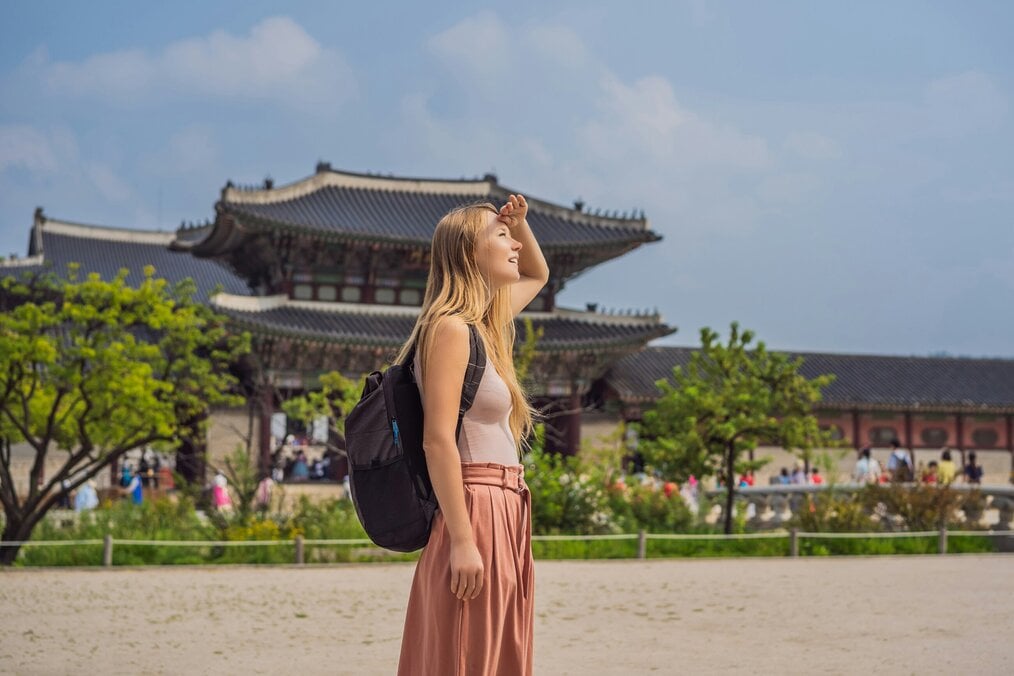
There’s something for everyone in South Korea! Whether you’re an enthusiastic Korean language student or are simply curious about the culture, you can find classes to match your abilities and fulfill requirements at your home university.
Can you study abroad in Korea in English?
Yes, you can study abroad in South Korea in English! While some knowledge of Korean would certainly be helpful and can improve your overall experience, if you’re an absolute beginner, you can find classes conducted in English.
University-led programs tend to focus on language and culture and cater to students studying Korean but some programs welcome all majors. Check with your home university to see what options you have.
Private providers usually run study abroad programs in Korea for all students, regardless of language ability, and offer classes covering Korean culture, introductory language studies, and the arts and sciences.
Top universities for international students in South Korea
Korea is home to some of the world’s top universities. Education is taken seriously here so wherever you choose, you’re bound to have a fantastic learning experience.
A few of the best universities chosen by international students in Korea include:
- Yonsei University
- Korea University
- Chonnam National University
- Seoul National University
- Korea Advanced Institute of Science & Technology (KAIST)
- Kyung Hee University
- Sogang University
- Sungkyunkwan University (SKKU)
To learn more about each of these universities, check out this article: Top 8 Universities in South Korea for International Students.
Types of study abroad
You’ve seen the options of where to study in South Korea, but do you know you have choices for how to study, too? Here are three ways to attend university in Korea as an international student:
- Program provider: Study abroad program providers are private organizations that you attend independently from your university but can transfer credits back. They tend to be all-inclusive and help you with paperwork for enrollment and visas. For example, for a semester with CIS Abroad in Seoul, your fees will cover tuition, housing, airport pickup, medical insurance, visa assistance, events and excursions, and 24/7 support. Even though program providers are often the pricier option, they are with you from start to finish.
- University-led: If your university has a partnership with one or more Korean universities, you may be able to participate in a university-led or even a semester exchange program. You will pay tuition to your home university while attending the program abroad. Transferring the credits you earned abroad is very easy.
- Direct enrollment: This is potentially the most affordable way to study abroad in Korea but it also takes the most legwork from you. You will need to handle all the logistics of applying directly to a Korean university, securing housing, and handling the transfer of credits back to your home university. If you’re more independent, this option is a great way to save money.
There are pros and cons to every option so you’ll have to weigh them to determine what’s right for you.
3. Research sources of funding
If you’re wondering if it’s expensive to study abroad in Korea, the answer is that it depends. But, generally speaking, it’s more affordable than university in the US. A semester at a Korean university will cost you between $1,800 to $6,000 in tuition fees if you enroll directly.
Alternatively, studying abroad through a program provider will cost anywhere from $9,000 to $19,000 USD. It’s important to remember that these fees are higher because they generally include tuition, housing, insurance, support, visa assistance, some added excursions, student events, and more.
The cost of university doesn’t have to be an obstacle that prevents you from studying abroad in South Korea. With proper planning, it’s possible to find affordable programs and scholarships that reduce the overall burden.
Can I study abroad in Korea for free?
While South Korean universities are not free for international students, the tuition fees are very reasonable when compared with US universities. To reduce your overall cost, apply for as many scholarships and grants as you are eligible for. Also consider a university exchange program which entails paying your home tuition as normal and swapping places with a Korean student for a semester.
Ways to cut the cost of studying abroad
- Student loans: You can use your federal student loan money for study abroad! Whether you do a program through your university, go with a private program provider, or enroll directly for a semester or year, your loan money can be applied to overseas tuition costs.
- Scholarships and grants: Opportunities for merit-based or needs-based scholarships and grants for study abroad exist if you know where to look. GO’s scholarship hub has a wealth of information to peruse including articles about study abroad scholarships you can apply for today. Fastweb is another website that helps match students with scholarships.
4. Confirm you meet requirements and gather documents
This is probably the least fun step but it’s one of the most important! You’ll need to be super organized and on top of deadlines to make sure you get everything done in time. If you study abroad through a program provider, they will help you through the process and double check you have everything in order.
Students who enroll directly in a Korean university or do a university-led program will need to be a little more independent. Here’s what you can expect at this step in your study abroad journey!
Application deadlines
Deadlines will differ depending on how you choose to study abroad. Korean universities, like the US, have fall and spring semesters although the dates slightly differ. Fall runs from September to December with application deadlines rolling from May to June. Spring runs from March to June with application deadlines falling between September and November.
University-led study abroad programs and program providers usually accept applications up until February through May for a fall start in Korea and September through November for the following spring semester.
Fees
Application fees vary based on the method you choose to study abroad. Not all universities or organizations have application fees but for the ones that do, here are the average costs:
- Program provider: Not all program providers require prospective participants to pay to apply but for the ones that do, you can expect to pay between $50-$100 USD.
- University-led: Some universities may charge students an application fee between $10-$150 USD to apply for student abroad programs.
- Direct enrollment: Korean universities often require an application fee between $40-$200 USD.
Requirements to study in Korea
As always, requirements will depend on the program or university you choose, but as a general guide, students will need to meet the following:
- Minimum of 2.5 GPA
- Sophomore standing
- If taking classes in Korean, proficiency at a level of at least TOPIK 5 (advanced)
Documents needed for your application
Now that you’re ready to put your study abroad application together, here are the documents commonly needed.
- Completed application form
- University transcripts
- Letter(s) of recommendation from your professors
- Personal statement
- Language proficiency test results (if applicable)
Program providers tend to require less documentation at the time of application.
5. Apply!
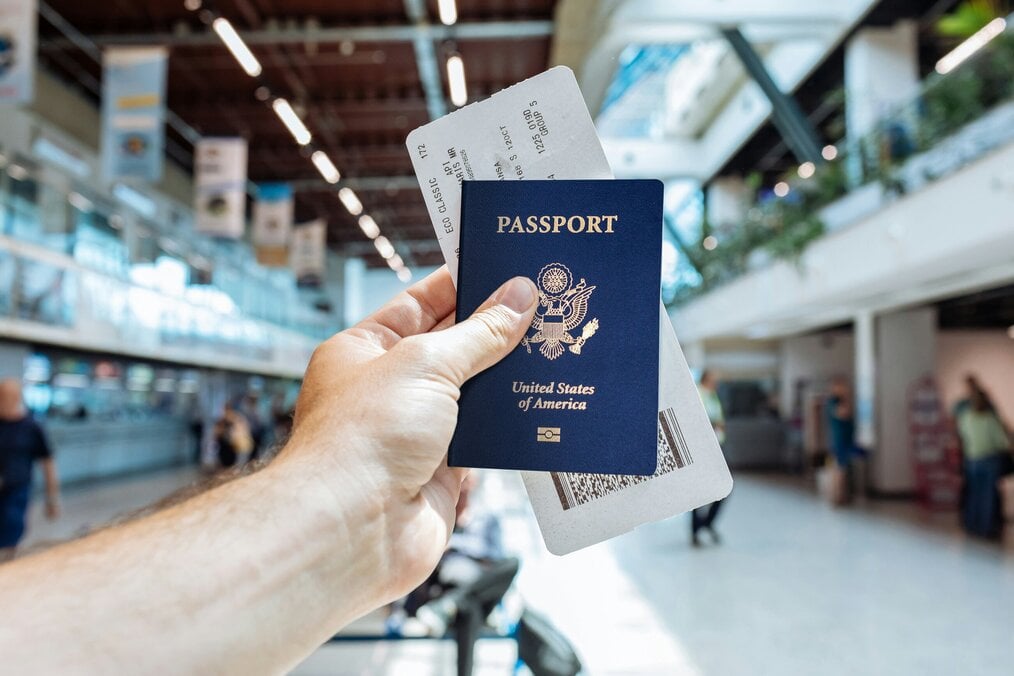
If applying through a program provider, the initial application process can be as simple as filling out an online form with basic information, paying an application fee, and submitting it! An advisor will then reach out to you to begin helping you with the next steps. They will ensure you have the right documents and will submit them on your behalf.
Direct enrollment and university-led students will need to complete the application packet online and upload the above documents often in the university’s application portal. Direct enrollment students will need to handle mailing original documents and official transcripts to their Korean university.
6. Secure your visa
Depending on your nationality and length of study, you may need to apply for a student visa to study in Korea as a foreigner. US citizens can study in South Korea for up to 90 days without a student visa so if you’re planning to attend a summer program, you’re in luck. Anyone studying for a semester or academic year will need to apply for a D-2 Study Abroad visa.
Requirements for a student visa in South Korea
To apply for the D-2 visa as a US citizen, you’ll need to gather the following documents:
- Printed and completed online application form
- Passport
- One 2x2 ID photo
- Bank statements showing funds covering cost of living while in Korea
- University transcripts demonstrating proof of enrollment
- Recommendation letter from your university
- Certificate of Admission (CoA) from your Korean university
- Your Korean university’s Certificate of Business Registration
If you’re studying abroad through a program provider or your university, they will give you a list of the exact documents needed as well as advice on how to obtain them.
Fees
Application fees vary by country but can cost anywhere from $40-$250 USD depending on your nationality and number of entries allowed on the visa. US citizens are only required to pay $45 regardless of whether the visa is single or multiple entry.
How to apply
Once you gather all of your documents, you’ll need to submit them (along with your passport) to your nearest South Korean consulate in your home country. Some require you to make an appointment and attend in person to hand over your application.
Others may allow you to mail the packet to the consulate with a prepaid and self-addressed envelope so they can return your passport with the included D-2 student visa to you.
7. Pack your bags
Packing is the most exciting part for some people and a complete nightmare for others. Here are some tips to make packing for your study abroad in Korea a breeze!
- Make a list: Sitting down and making a list of the things you want and need to bring will make things a bit less chaotic. Have separate lists for your checked luggage and carry-on/personal item. Cross items off as they’re stowed away to be sure you don’t miss anything!
- Use packing cubes: These things really work! Not only do they compress clothes into a tidy package, but you can group similar items like tops, socks and underwear, and pants to stay organized.
- Don’t bring items you can buy in Korea: Skip the full-size bottles of shampoo, toothpaste, lotion, and other personal care items. Korea is famous for its amazing health and beauty products – it’ll be fun to try new things!
- Mix and match: To avoid overpacking, try to pick clothes that can be mixed and matched to make a variety of outfits. Do the same with shoes. You’ll probably want to go shopping while you’re there and pick up some new outfits anyway. The exception to this is if you’re very tall or wear a larger US size in which cases, clothes and shoe shopping can be tricky.
- Bring some small mementos from home: Being able to decorate your dorm or student apartment with some small familiar and beloved items will make it feel more like a home away from home. Think pictures, small statues, artwork, or even a favorite stuffed animal.
Is studying abroad in South Korea worth it?
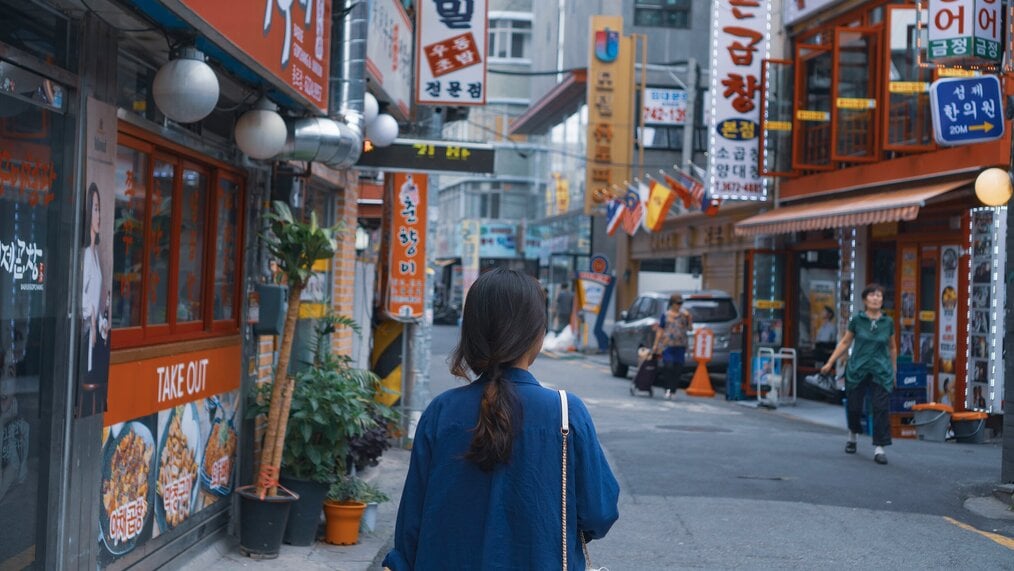
If you have an interest in Korean culture and are looking to step outside of the norm, studying abroad in South Korea is 100% worth it. The ability to study in English, affordable tuition fees, and a vibrant, safe atmosphere for students all make South Korea a top destination for international students.
Why study abroad in Korea?
South Korea is an affordable, welcoming, and interesting country, steeped in art, history, and pop culture. Studying abroad in South Korea will allow you to get to know a culture that is likely quite different from your own. This can have several benefits including increasing your empathy, boosting your creativity, and improving your self-confidence as you navigate new surroundings.
Study abroad in South Korea for the fun, excitement, and connections and experience personal growth at the same time!
Start your studies abroad in South Korea
South Korea is becoming an increasingly popular study abroad destination as more students discover the incredible things the country has to offer. Choosing to study in Korea as an international student is likely going to be an experience of a lifetime and not one you’ll soon forget. Start planning your study abroad today!

